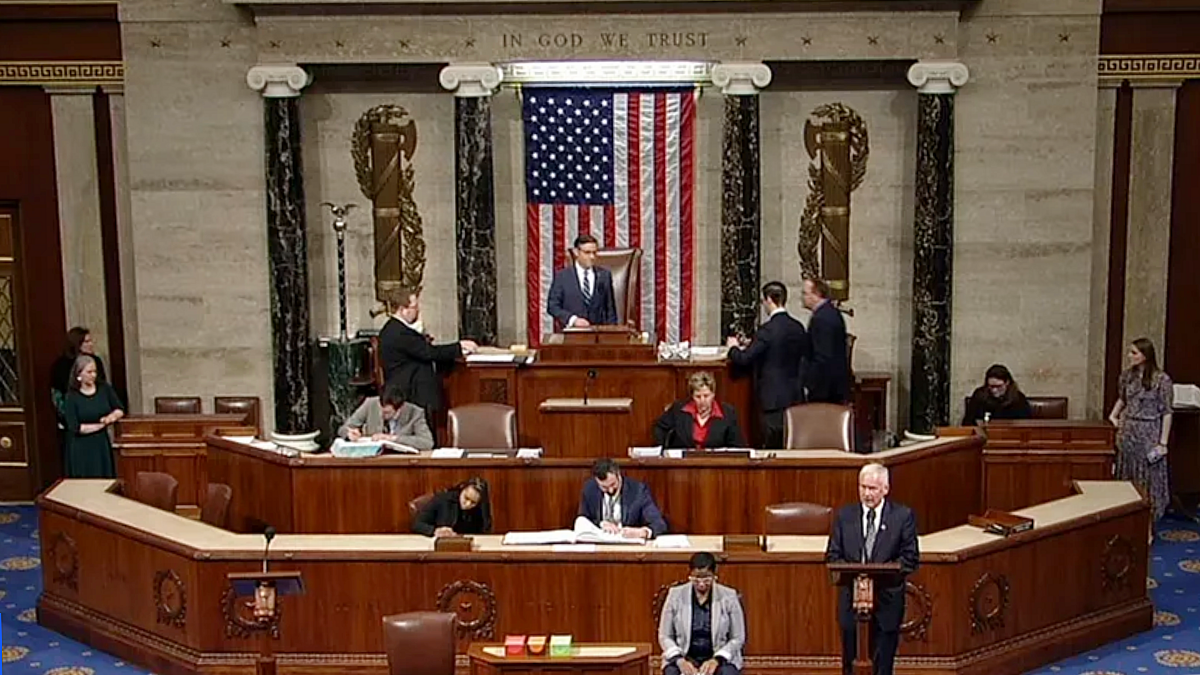US House of Representatives Overwhelmingly Passes Bill Aimed at TikTok
Gabby Miller / Mar 13, 2024
US House of Representatives voting for the "Protecting Americans from Foreign Adversary Controlled Applications Act" on March 13, 2024.
On Wednesday, March 13, the US House of Representatives passed a bill that would functionally ban TikTok from the US. The fast-tracked bill, called the "Protecting Americans from Foreign Adversary Controlled Applications Act" (HR 7521), would force TikTok’s China-based parent company, ByteDance, to divest from China within six months or face a ban from app stores in the US. It overwhelmingly passed by voice vote, meeting the required two-thirds majority threshold with a 352 to 65 vote.
The bill was introduced to the House Energy and Commerce Committee on March 5, 2024, by Reps. Mike Gallagher (R-WI) and Raja Krishnamoorthi (D-IL), top lawmakers on the House Select Committee on the Chinese Communist Party. In an unusual move, the bill passed unanimously out of committee, 50-0, within just a week of its introduction.
The bill’s stated aim is to “protect the national security of the United States from the threat posed by foreign adversary controlled applications, such as TikTok” or any other product developed or provided by ByteDance. The Energy and Commerce Committee also argues that the bipartisan legislation would prevent foreign adversaries, like the Chinese Communist Party (CCP), from “targeting, surveilling, and manipulating the American people through applications, like TikTok.”
Shortly after the White House expressed its support for the bill, the popular video-sharing app used its platform to lobby its 170 million users to “stop a TikTok shutdown.” In a series of push notifications sent to its users over 18, TikTok argued that the ban would “damage millions of businesses, destroy the livelihood of countless creators across the country, and deny artists an audience.” TikTok also urged its users to call their district representatives to stop the ban, redirecting users to a page where, upon entering their zip code, it automatically populated users’ phones with the number for their local representative’s offices. It was also reported that US congress members’ offices were flooded with calls from TikTok users in the lead up to the floor vote.
While the Act has been widely characterized as an outright ban, Committee Chair Cathy McMorris Rodgers (R-WA) disputed this framing while on a media blitz in the days leading up to the House floor vote. “This [bill] is not a ban. This would be a choice for TikTok, whether or not it remains controlled by the CCP [Chinese Communist Party] through ByteDance or if it decides to divest and to continue to be operational in the United States of America, but it is their choice,” she told CNBC’s Squawk Box.
Rep. Nancy Pelosi (D-CA) took a slightly different frame on Wednesday, arguing on the House floor that “this isn’t a ban, this is an attempt to make TikTok better.” She highlighted the dangers of a social media app with an algorithm controlled by the Chinese government – which she noted is committing a Uyghur genocide within its borders – that can be changed at any time.
Rep. Thomas Massie (R-KY) told the House floor on Wednesday that the bill might as well be called the “Facebook Protection and Enhancement Act,” as banning TikTok, he argues, would grow Facebook’s user base and profits. At the very least, he argued, the bill should have a sunset provision. “This is a cure worse than the disease,” Rep. Massie said, who believes the Act will inevitably be abused, and other measures, such as the Fourth Amendment is Not For Sale Act, would go further towards protecting data privacy.
A coalition of civil society groups, including the American Civil Liberties Union, the Center for Democracy & Technology, and others, disapprove of the Act on free speech grounds. In a letter sent to the House Energy and Commerce Committee on March 7, they argued that the bill would “violate the First Amendment rights of Americans across the country who rely on TikTok for information, communication, advocacy, and entertainment.” They believe the bill would effectively silence 170 million Americans who use TikTok every day, a claim repeated on the House floor Wednesday by the likes of North Carolina Republican Representative Dan Bishop.
Related Reading:
This is not the first time TikTok has come under fire by US lawmakers. In April 2023, the Montana state legislature passed a bill that similarly prohibits app stores from hosting TikTok over privacy and security concerns. The “Banning TikTok in Montana” bill (SB 419) sought to fine providers in the state $10,000 each day they were in violation of the law. It has since faced legal challenges and was blocked by a US District judge in November, right before the law was set to take effect. Montana was the first state to pass such a ban, but at least thirty states have taken up some form of legislative action restricting TikTok since its passage.
Rep. McMorris Rodgers also said that during President Joe Biden’s State of the Union, she spoke to several Senators willing to engage seriously with the legislation. “I’m very hopeful that we are going to get a bill on the President's desk ultimately,” she told CNBC.
Currently, there is no companion bill in the Senate. Sen. Chuck Schumer (D-NY) has not committed to whether the Senate would consider a version of the House bill, telling reporters on Tuesday that he will consult with “relevant committee chairmen to see what their views would be.” Sen. Rand Paul (R-KY) also vehemently opposes the bill, tweeting out warnings this week that a TikTok ban would lead to censorship by the US federal government.
Authors
